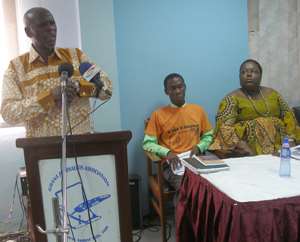
GHANA'S COALITION on the Right To Information (RTI) has issued a damning critique of the Information Bill, which is currently before Parliament, arguing it contains a lot of serious shortfalls that would be obstacles to citizens' right to know.
Despite several revisions of the Bill, the Coalition still lamented about its contents, which retained wide provisions on exemptions, fees to be charged before information is released, lack of timely access to information, lack of independent enforcement organ and cumbersome application procedure that could render the Bill ineffective if passed in its current state.
Interacting with the Parliamentary Press Corps in Accra yesterday, the Coalition indicated that the Bill does not contain provisions for independent appeals if applicants are denied information nor does it provide for a monitoring authority to oversee the working of the Law.
The Bill is currently with the Joint Committee on Constitutional, Legal and Parliamentary Affairs and Communications after many years of dilly-dallying by NPP and NDC administrations since 2002.
The RTI Coalition called on Parliament to strictly scrutinize the Information Bill so that it serves its intended purpose of ensuring that the public, citizens and non-citizens had access to information.
This information could be in the form of records, files, registers, maps, data, drawings and reports among others.
Mr. Akoto Ampaw and Nana Oye Lithur, who are both lawyers and members of the Coalition, explained that public institutions hold information in trust for the people and therefore the Bill should be passed in the form that ensures the citizens' right to information is not curtailed.
According to Mr. Ampaw, the provisions of the bill do not give incentives for timely release of information.
The RTI bemoaned the provisions which give an information officer 21 working days to even determine whether information is exempt or should be released, saying it should not take more than a day for such information to be given.
Again, the coalition said the Bill lacked an independent enforcement organ as the Attorney-General has been mandated to be responsible for its implementation and enforcement.
According to the Coalition, the Attorney-General is part of Cabinet and Government and therefore giving him or her such oversight responsibility, represents a clear case of conflict of interest.
It called for the establishment of an Independent Commission to monitor the implementation of the law once it is passed.
The coalition stressed the need for an elaborate penalty regime, which is a necessary tool for enforcement, which would uphold timely access to information and accountability.
It noted that sections of the Bill place blanket exemptions on information from the office of the President, vice president, cabinet and other public institutions, which are inimical to peoples' right to information.
For instance section 7(3) makes all information created by or in the custody of the securities and intelligence agencies totally exempt and therefore nobody can access information from these bodies.
Mr. Ampaw pointed that exemptions should only be based on whether the harm in disclosure outweighs the harm in non- disclosure to the public.
He further indicated that the right to information is a fundamental human right guaranteed under the 1992 Constitution and that its limitation can be justified only if it is reasonably necessary for the protection of the public interest or the rights and freedoms of others.
Every person, the Coalition asserted, shall have the right to information subject to such qualifications and laws as are necessary in a democratic society and not curtailed in the interest of a few individuals.
The Right To Information Bill, the Coalition advocated should ensure maximum disclosure and should cover public and private institutions whose activities affect human rights or are publicly funded.
The Coalition made up of different organizations including various media advocacy groups, religious bodies, human rights and legal interest groups, was established in 2003 to promote enhanced accountability in governance.
It has focused largely on the passing of the right to information legislation as a mechanism for greater participation in the country's democratic process.
By Awudu Mahama




 2024 election will be decided on the grounds of the economy; choice of running m...
2024 election will be decided on the grounds of the economy; choice of running m...
 Dumsor: We're demanding less; just give us a timetable — Kwesi Pratt to ECG
Dumsor: We're demanding less; just give us a timetable — Kwesi Pratt to ECG
 Do I have to apologise for doing my security work, I won’t – Simon Osei-Mensah r...
Do I have to apologise for doing my security work, I won’t – Simon Osei-Mensah r...
 Prestea and Bogoso mines: Complete payment of outstanding salaries not later tha...
Prestea and Bogoso mines: Complete payment of outstanding salaries not later tha...
 NDC postpones Prof. Opoku-Agyemang entry tour to May
NDC postpones Prof. Opoku-Agyemang entry tour to May
 All my businesses have collapsed under Akufo-Addo — NDC Central regional chair
All my businesses have collapsed under Akufo-Addo — NDC Central regional chair
 Military, Prison Officers clash in Bawku, three injured
Military, Prison Officers clash in Bawku, three injured
 GRA-SML contract: MFWA files RTI request demanding KPMG report
GRA-SML contract: MFWA files RTI request demanding KPMG report
 Court threatens to call second accused to testify if NDC's Ofosu Ampofo fails to...
Court threatens to call second accused to testify if NDC's Ofosu Ampofo fails to...
 Family accuses hospital of medical negligence, extortion in death of 17-year-old...
Family accuses hospital of medical negligence, extortion in death of 17-year-old...
